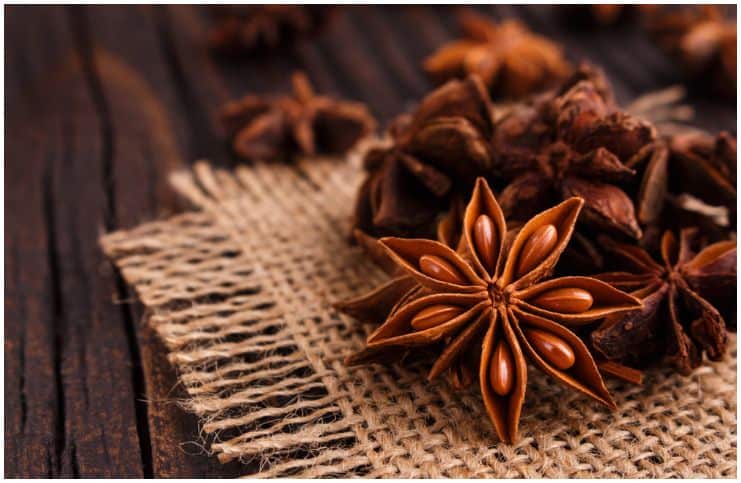Star Anise (Illicium Verum) – Side Effects, Facts, Health Benefits, Medicinal Uses:
Also known as Chinese or Indian anise, star anise is native to southern China and northern Vietnam.
It is now cultivated in other countries in the South Asian continent, especially in Cambodia and Laos, but also in Japan and the Philippines.
As the name implies, it is a jewel of rare beauty between spices. It is the fruit of an evergreen tree, that reaches up to 8 meters tall and lives 100 years.
The fruit in the form of a star has five to ten corners (an average of eight), which are, in fact, the pods containing the seeds. With thick, rusty peel, it reaches lengths of up to 3 cm.
The fruits are found whole or crushed, as reddish-brown powder. If they are kept in tightly closed containers, away from air, light, and moisture, their shelf life can be extended over a year.
Nutritional Profile
The main elements contained in 100 g of fruits are – 1.2 to 6 g volatile oil consisting of 80-90% anethole, methylchavicol or isoanethole, small amounts of ketones, anise aldehydes, and acetous acetaldehyde; 10-20% fat; 20% protides, sugars, starch, 6-10% minerals.
It also contains phosphorus and calcium, however, in terms of its medicinal value and effects, perhaps its most important substance in this plant is called – shikimic acid, a potent plant-based substance that is the precursor to oseltamivir, an antiviral prescription drug that is sold under the name of Tamiflu.
Although it doesn’t resemble nor is related to anise, it shares the same name with it because they have a similar smell. However, it has a stronger, sharp, and deep flavor. Moreover, the chemical composition and the application area of the two plants are quite different.
While classic anise is used mainly for digestive, hormonal, and respiratory disorders, it is used traditionally in addition to digestive diseases, also in cases of influenza, viral diseases, and cancer. Both plants are used as spices, but also as medicine for millennia.
Health Benefits
Respiratory virosis
In this category of conditions, star anise seeds powder is almost unbeatable. The antiviral effect of this plant is due to a substance contained in its seeds, called shikimic acid, which, once arrived in the liver, transforms into a strong antiviral, which reaches the blood circulation.
Cancer
Various types of cancer, used as a spice, along with turmeric and coriander, are an extraordinary prophylactic remedy against cancer.
Statistical studies have shown that populations of Southeast Asia, that use large amounts of this combination of spices, have a much lower rate of gastric, intestinal, and lung cancer.
The anti-carcinogenic effect is due to the powerful anti-oxidants of the spice and the other spices, preventing cell mutations and the development of malignant tumors.
Viral Hepatitis
It is successfully treated in traditional Chinese medicine with a combination of Chinese anise, licorice (Glycyrrhiza glabra), and astragalus (Astragalus membranaceous).
The three plants are administered as a combination of powder, in equal proportions, taking 3-4 grams, three times a day on an empty stomach.
The mixture has a direct antiviral effect, and it strongly activates the immune system and protects healthy liver cells from the spread of the infection.
Rebel Cough
Inhalation with star anise seeds has a soothing effect. Pour boiling water over two teaspoons of ground seeds.
The patient sits a few centimeters over the steaming cup with the nostrils, covering his head with a towel so that the hot steam is fully inhaled. The soothing effect occurs immediately.
Other benefits and uses
A local massage with essential oil extracted from the seeds of Chinese anise, oil-based diluted and in a very small dose:
- relieves bone or muscle pains;
- removes fatigue and inner tensions.
It has decorative purposes, too, particularly in tropical climates, due to its fragrant leaves and small, scented flowers.
Side Effects of Star Anise (Illicium Verum)
It is contraindicated in cases of hyperacid gastritis, gastric and duodenal ulcer, chronic and acute enterocolitis.
READ THIS NEXT:
Turkish Hazel (Corylus Colurna) – Facts, Uses, Health Benefits
Rhubarb – Side Effects, Health Benefits, Nutrition Facts
Anise Seed (Pimpinella Anisum) Side Effects & Medicinal Uses
Jalapeno Pepper: Health Benefits, Nutrition Facts, Side Effects
References https://www.sciencedirect.com/topics/food-science/star-anise https://academic.oup.com/japr/article/26/4/459/4158453

These health facts are Great, thank you so much.
really great!!!